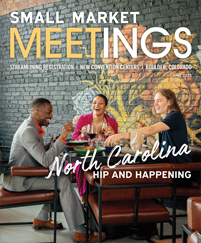There’s vegetarian, vegan, gluten-free, dairy-free, sugar-free, low sodium and no sodium. People have nut allergies, shellfish allergies and mushroom allergies. The list of dietary restrictions and requests is rising faster than bread dough, which is a good thing, said Tracy Stuckrath, president and “chief connecting officer” of Thrive! Meetings and Events. It means people are paying more attention to their health and being more proactive about what they eat, she said.
Although the ever-growing list of dietary needs can be intimidating to meeting planners and meeting venues alike, it doesn’t have to be, she said.
Stuckrath was diagnosed with a yeast allergy in May 2003. She had been working as a planner since college, but it wasn’t until 2008 — five years after her allergy diagnosis — that she started to grow frustrated with not being able to eat well during meetings and events. Stuckrath enrolled in the Institute for Integrative Nutrition in New York City, where she had an “aha!” moment that eventually led her to found Thrive! in May 2010.
“I love meeting planning, and I love nutrition; why not do the two?” said Stuckrath, who writes, teaches and lectures on the topic.
Communication Is Critical
Communication is the most important thing for meeting planners, venues and attendees when it comes to dealing with dietary restrictions, she said. Planners must ask, attendees must answer honestly, and venues must receive all the information and be willing to accommodate the ever-growing list of dietary restrictions.
On registration forms, planners must ask about allergies or restrictions, “and they must ask very clearly,” Stuckrath said. Don’t make it an open-ended question; instead, include a checklist with specific allergies, intolerances and special diets, including religious dietary needs.
“Your registration form at a minimum should have options for vegan, vegetarian, kosher, halal [Islamic dietary laws], food allergies and gluten-free,” Stuckrath said.
Attendees also need to be upfront about their needs. Sometimes people who have allergies or follow special diets don’t speak up because they don’t want to be a burden or call attention to themselves, she said.
“You need to be honest with us because, obviously, we don’t want you to die from a serious allergy,” Stuckrath said, adding that even if the request isn’t a life-or-death issue, “we want to and we can provide a better experience for you.”
“My preference is to give [attendees] meal tickets or meal cards so there’s no confusion, and it’s discreet,” she said. “We’ll also introduce them to the hotel staff or talk to the chef if there is something very particular about their needs.”
But attendees shouldn’t request special meals if they don’t plan to eat them. Stuckrath has seen events pay for hundreds of special meals at the request of guests, yet only a fraction of the meals were eaten. Likewise, planners shouldn’t assume special meals are needed. She knew of a planner who was bringing in guests from the Middle East and assumed they needed halal meals to adhere to Islamic dietary laws when, in fact, the guests didn’t need and didn’t eat the dishes.
Don’t Be Intimidated
Planners and venues shouldn’t let the long list of dietary needs intimidate them, Stuckrath said. An event may have 10 different types of dietary requests but only need three different meals because many needs can be addressed in one meal. One entree could be both dairy-free and vegan, for example.
Meeting venues and their catering partners should also be able to label food with each ingredient, and have servers or managers on hand who know what’s in each dish, Stuckrath said.
Event staff at Monona Terrace Community and Convention Center in Madison, Wisconsin, have seen the number of special dietary requests explode over the past decade, especially in the past few years, said Wendy Brown-Haddock, senior sales manager for Monona Catering, the venue’s contracted caterer.
“I would say that every function we do has some special dietary needs,” she said. “It’s unheard of to not have any special meals these days. We do a double-take if there are no special meals.”
Monona Catering retooled its menu for 2014 to be sensitive to both allergies and personal preferences. This is the first year the company has labeled menu items to show which are gluten-free; the caterer also turned a vegetarian meal into a vegan option, she said.
“We’re getting a little smarter with our menus and really listening to the public,” Brown-Haddock added. “We would like to stay ahead of the curve and be proactive. When a client looks at our menus, they’ll be confident that we’ll take care of those special dietary needs.”












